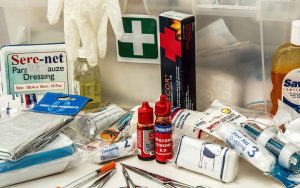Are Modular Enclosed Units the Future of At-Home Dialysis?
Advancements in healthcare technology are continually reshaping how patients manage chronic conditions, and at-home dialysis is no exception. Finding solutions that combine efficiency, safety, and comfort is a growing priority for both patients and caregivers. In exploring new possibilities, this look at mobility scooter comfort and safety offers valuable insights into how design improvements can enhance everyday usability and well-being. Similarly, modular enclosed units for dialysis aim to provide a secure, convenient, and patient-friendly environment at home. By examining these innovations, we can better understand how thoughtful design and technology converge to make critical healthcare routines more manageable and less disruptive to daily life.
Safety and Controlled Environment
One of the key advantages of modular enclosed units is the enhanced safety they provide. Dialysis requires strict hygiene and careful monitoring of fluid and equipment, and an enclosed unit ensures that these standards are easier to maintain at home. The controlled environment minimizes contamination risks, regulates temperature, and isolates the treatment space, which reduces stress for both patients and caregivers. Many units include built-in alarms, automated systems, and ergonomic layouts to prevent errors, making treatment more reliable. By creating a dedicated space for dialysis, modular units help patients manage their care confidently while reducing potential complications.
Comfort and Convenience at Home
Modular enclosed units are designed with patient comfort in mind. Unlike traditional setups that might require a corner of a living room or a makeshift arrangement, these units provide a structured and private space for treatment. Features like adjustable seating, …





 Chemotherapy drugs are potent in attacking cancer cells, but they can also affect healthy cells, including those in the digestive system. This disruption often leads to intense nausea and vomiting, known as chemotherapy-induced nausea and vomiting (CINV). CINV can severely impact a patient’s quality of life and even lead to treatment discontinuation. While there are medications available to manage CINV, they may not work for everyone, and they can have their own side effects.
Chemotherapy drugs are potent in attacking cancer cells, but they can also affect healthy cells, including those in the digestive system. This disruption often leads to intense nausea and vomiting, known as chemotherapy-induced nausea and vomiting (CINV). CINV can severely impact a patient’s quality of life and even lead to treatment discontinuation. While there are medications available to manage CINV, they may not work for everyone, and they can have their own side effects. 
 When it comes to cancer, catching it in its early stages is essential. While the exact causes of most cancers are still unknown, medical professionals agree that the earlier cancer is detected, the better your chances for a successful treatment.
When it comes to cancer, catching it in its early stages is essential. While the exact causes of most cancers are still unknown, medical professionals agree that the earlier cancer is detected, the better your chances for a successful treatment.

 Another benefit of protein is that it helps to build and repair bones and muscles. This is especially important for athletes or anyone who engages in regular physical activity. Protein provides the necessary nutrients for your body to recover from exercise and rebuild muscle tissue. Also, if you are over the age of 50, protein can help to prevent age-related muscle loss. As we age, our bodies become less efficient at using protein to build muscle.
Another benefit of protein is that it helps to build and repair bones and muscles. This is especially important for athletes or anyone who engages in regular physical activity. Protein provides the necessary nutrients for your body to recover from exercise and rebuild muscle tissue. Also, if you are over the age of 50, protein can help to prevent age-related muscle loss. As we age, our bodies become less efficient at using protein to build muscle.
 This is probably the most essential thing to consider when getting medical information online. Just because something is published on the internet does not mean that it is true. In fact, there are a lot of myths and misinformation out there. So, how can you tell if what you’re reading is accurate? The best way to tell if a website is reliable is to look for information about the author. Is the author a medical doctor or other health care professional? If so, they are more likely to have accurate information. It would help if you also looked for references and sources cited on the website.
This is probably the most essential thing to consider when getting medical information online. Just because something is published on the internet does not mean that it is true. In fact, there are a lot of myths and misinformation out there. So, how can you tell if what you’re reading is accurate? The best way to tell if a website is reliable is to look for information about the author. Is the author a medical doctor or other health care professional? If so, they are more likely to have accurate information. It would help if you also looked for references and sources cited on the website.



 Many customers who have tried one of the available traction devices have noted that a static …
Many customers who have tried one of the available traction devices have noted that a static …
 Many people now consider it a mental issue. Nonetheless, this isn’t the situation. Vascular disorder, diabetes, cardiovascular disorder, and the consequences of operation may lead to erectile dysfunction. In the time of the process, many people over age 50 have erection issues. They want surgery for everyone these conditions and through operation, the nerves which supply the penis can be ruined, resulting in erectile dysfunction. As stated previously, psychiatric issues also cause erectile dysfunction. The brain is involved with getting an erection and the pleasure and pleasure related to sexual activity. Therefore any problem that interferes with the job of their brain can lead to ED.
Many people now consider it a mental issue. Nonetheless, this isn’t the situation. Vascular disorder, diabetes, cardiovascular disorder, and the consequences of operation may lead to erectile dysfunction. In the time of the process, many people over age 50 have erection issues. They want surgery for everyone these conditions and through operation, the nerves which supply the penis can be ruined, resulting in erectile dysfunction. As stated previously, psychiatric issues also cause erectile dysfunction. The brain is involved with getting an erection and the pleasure and pleasure related to sexual activity. Therefore any problem that interferes with the job of their brain can lead to ED.
 It enhances our self-image, occasionally we aren’t pleased with our physiological human anatomy or body of our entire body, the shape of our nose, that the increase of hair in areas where it shouldn’t grow, to help us achieve the desired body contour and increase our self-image. It enhances health, some processes like liposuction, which manages to take out the total amount of fat in your system, rhinoplasty, which may aid in improving attractiveness, breast reduction operation, which may help women get rid of this pain. Consult with an experienced cosmetic surgeon that will provide you a reply to your issue. It helps enhance psychological wellbeing. As soon as we do not feel great about our look, it may have a critical effect on our mental wellbeing. Individuals that are self-conscious in their look might feel miserable as they create an overall belief in a social meeting. Depression and anxiety can be further common issues. It helps enhance self-confidence. Cosmetic surgery can enhance your attractiveness and be successful in your related field.
It enhances our self-image, occasionally we aren’t pleased with our physiological human anatomy or body of our entire body, the shape of our nose, that the increase of hair in areas where it shouldn’t grow, to help us achieve the desired body contour and increase our self-image. It enhances health, some processes like liposuction, which manages to take out the total amount of fat in your system, rhinoplasty, which may aid in improving attractiveness, breast reduction operation, which may help women get rid of this pain. Consult with an experienced cosmetic surgeon that will provide you a reply to your issue. It helps enhance psychological wellbeing. As soon as we do not feel great about our look, it may have a critical effect on our mental wellbeing. Individuals that are self-conscious in their look might feel miserable as they create an overall belief in a social meeting. Depression and anxiety can be further common issues. It helps enhance self-confidence. Cosmetic surgery can enhance your attractiveness and be successful in your related field.




 Emotional Distress
Emotional Distress

 The aligner lab will create your custom aligners based on your dental …
The aligner lab will create your custom aligners based on your dental …
 Health is especially important for women. A woman who is too thin or too obese may not look good. To maintain health, the daily diet is an extremely important component. To compensate for excess calories, you need to eat every day and follow a healthy diet. Avoid fatty foods as much as possible because they contain a lot of fat in your body and make you look brighter and brighter in your skin color. Therefore, your diet plan should be more balanced to meet all your nutritional needs and reduce cholesterol levels. Your cholesterol level …
Health is especially important for women. A woman who is too thin or too obese may not look good. To maintain health, the daily diet is an extremely important component. To compensate for excess calories, you need to eat every day and follow a healthy diet. Avoid fatty foods as much as possible because they contain a lot of fat in your body and make you look brighter and brighter in your skin color. Therefore, your diet plan should be more balanced to meet all your nutritional needs and reduce cholesterol levels. Your cholesterol level …



 To start changing to
To start changing to  You generally need to pick vegetables as …
You generally need to pick vegetables as …
 Improve the Energy
Improve the Energy



 Whenever you do CPR to a patient, make certain to wear a face mask or shield to prevent direct contact with your individual. During transit, it’s feasible for fluids to be moved from the individual to you, a cover can protect you.
Whenever you do CPR to a patient, make certain to wear a face mask or shield to prevent direct contact with your individual. During transit, it’s feasible for fluids to be moved from the individual to you, a cover can protect you.
 You could close your eyes for a few moments or look out the window at the rich tones. This is especially recommended for players whose eyes are constantly exposed to fast-moving images, very bright colors, and rapid flashes of light during the game. …
You could close your eyes for a few moments or look out the window at the rich tones. This is especially recommended for players whose eyes are constantly exposed to fast-moving images, very bright colors, and rapid flashes of light during the game. …